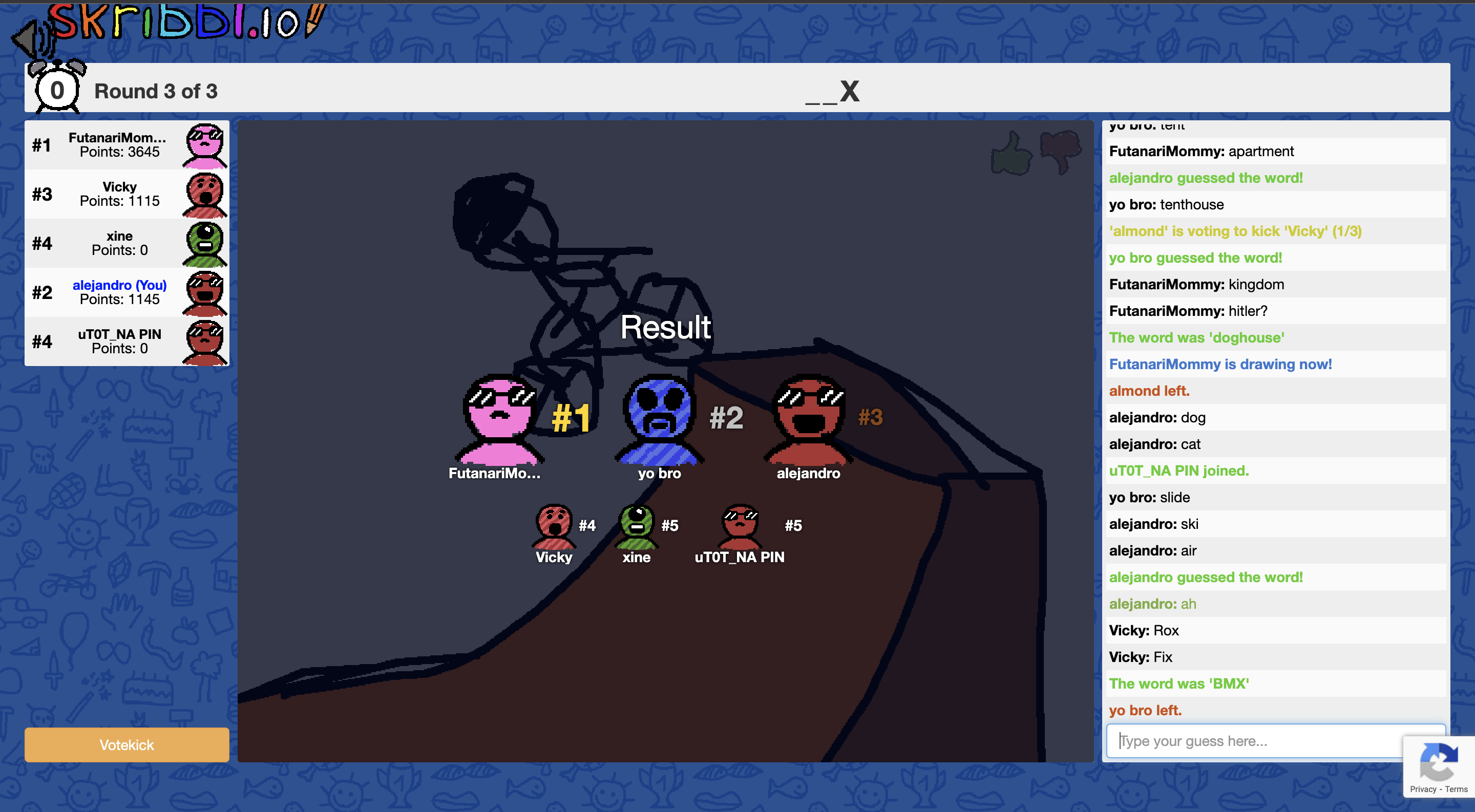For this week’s Critical Play, I played around with skribbl.io. Skribbl.io is an online multiplayer game where one player draws a prompt while the other players attempt to guess what the prompt is. In this way, it is quite similar to Pictionary with a few differences. The game’s development is attributed to a single creator — a Twitter user who goes by the handle @ticedev.
As far as I can tell, skribbl.io doesn’t have any particular target audience. The website is completely accessible to anyone with an Internet connection, and the interface is rather user-friendly for players young and old. The word prompts themselves are also fairly standard — nothing too specific or advanced for, say, a 12-year-old to understand.
Skribbl.io’s gameplay is rather scalable for large and small groups of players. The mechanics lend themself as readily for 2 players as they do for 12 players. In fact, I think that the game could be scaled to several dozen players — if not hundreds — if the drawing role is randomly sampled instead of passed around to each player. In each round, the players are assigned to one of two roles: the singular drawer, or the guessers. The drawer is allowed to choose a word from a set of prompts and must draw on a virtual canvas as best as they can to properly convey the word. On the other end, the guessers are competing against each other to guess the word conveyed by the canvas as quickly as possible. Guessers are aided by knowing the length of the word, and occasionally are given letters within the word. Points are awarded to the drawer and guessers depending on how quickly the word was guessed and how many guessers were correct. In any case, the round is bound by a time-limit of 80 seconds. The rounds proceed until each player has had the opportunity to be a drawer thrice. At the end, the player with the most points is declared the champion.
At first glance, skribbl.io seems to best embody the “expression” type of fun — each player is given several opportunities to creatively portray their given prompt through drawing and artistic expression. One could even argue that skribbl.io embodies the “challenge” type of fun — I mean, how easy is it to convey the word “afterlife” to a group of people using nothing but a drawing made in a little over a minute. However, I feel that skribbl.io best demonstrates the fun of “fellowship” — of light-hearted social interaction. In skribbl.io, the input to guess a drawing’s word is actually a public chat between the players. In addition to guessing words, players can interact with each other through this chat. Indeed, some of my favorite moments playing skribbl.io had nothing to do with the true mechanics or procedures of the game — they had to do with the player chat and all the tomfoolery happening within it. As frustrating a poor drawing might be to guess, the joy of reading all the other guessers becoming frustrated and playfully roasting the drawer makes it worth it.
I think it is this playfulness that gives skribbl.io its unique brand of fun. This is a sort of playful that is expressed even within the visual design of the game. Visually, skribbl.io is rough, colorful, fun, and rudimentary, as if a child designed the website with a crayon. Its sketch-y texture conveys to players what the game is about — its not about producing picture-perfect portraits of the prompts. It’s about making something rough and ready, about conveying as much meaning with as little as possible.
Overall, I appreciate skribbl.io amongst the crowd of judging games. The pace is much faster — and thus more engaging for all players all the time — than others within the genre. The way players evaluate each item is less subjective to the taste of the players and relies more on your ability to convey meaning visually. While this game’s mechanics create less opportunity for raucous laughter than Cards Against Humanity, I believe it makes up for it by having longer play life — gameplay takes much longer to become stale than CAH. Skribbl.io also requires much less vulnerability than other games within the genre — and thus is more accessible for casual occasions than something like CAH. That said, skribbl.io still gives ample opportunity to “break-the-ice” between players with its focus on silly drawing and playfulness.



